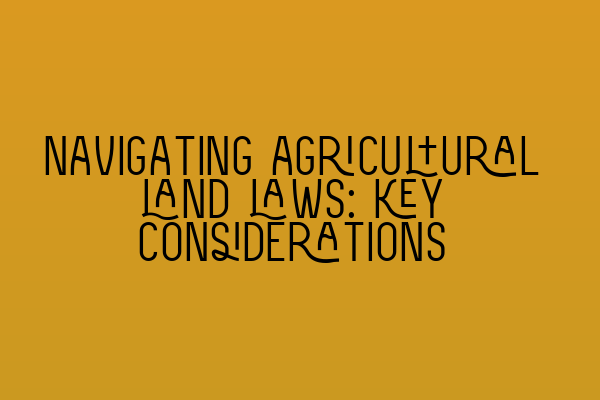Navigating Agricultural Land Laws: Key Considerations
Agricultural land laws can be complex and challenging to navigate. Whether you are a farmer, investor, or landowner, understanding these laws is crucial to ensuring compliance and protecting your interests. In this blog post, we will explore the key considerations when dealing with agricultural land, providing you with valuable insights on how to navigate this terrain effectively.
1. Land Usage Restrictions:
When dealing with agricultural land, it is essential to understand the restrictions on land usage. Certain areas may have specific regulations that dictate how the land can be used, such as zoning restrictions or conservation easements. Familiarize yourself with these regulations to avoid potential legal issues down the line.
2. Environmental Regulations:
Agricultural land often falls under the scope of environmental regulations. These regulations are in place to protect the environment and natural resources. Familiarize yourself with the relevant laws, such as water usage restrictions and waste management requirements, to ensure compliance. Being environmentally conscious not only helps you avoid legal troubles but also benefits your reputation as a responsible landowner.
3. Contracts and Agreements:
When engaging in transactions involving agricultural land, it is crucial to have well-drafted contracts and agreements in place. These contracts should clearly outline the terms and conditions of the transaction, including purchase price, payment terms, and transfer of ownership. Seeking legal advice to draft or review these contracts can ensure that your interests are protected and any potential pitfalls are avoided.
4. Succession Planning:
If you are a farmer or landowner, succession planning is a significant consideration. Planning for the future transfer or passing on of your agricultural land can help prevent disputes and ensure a smooth transition. Consulting with an experienced solicitor who specializes in agricultural law can provide valuable guidance on succession planning and help you draft a comprehensive plan.
5. Tax Implications:
Agricultural land transactions often have tax implications that need to be carefully considered. Capital gains tax, inheritance tax, and income tax can all come into play depending on the nature of the transaction. Seeking professional advice from a tax specialist can help you navigate the tax landscape and ensure compliance with relevant regulations.
6. Common Law Rights:
In addition to statutory regulations, common law rights can also impact agricultural land. It is essential to understand and protect your common law rights, such as rights to access water sources, grazing rights, or rights of way. Conducting a thorough title search and consulting with a property law expert can help you identify and safeguard these rights.
7. Land Registration:
Registering your agricultural land with the Land Registry can provide added security and protection for your ownership rights. Land registration ensures that your ownership is properly recorded, making it easier to deal with any potential disputes in the future. Consult with a property law solicitor who can guide you through the process and ensure compliance with registration requirements.
In conclusion, navigating agricultural land laws requires a comprehensive understanding of the relevant regulations and key considerations. By familiarizing yourself with land usage restrictions, environmental regulations, contracts and agreements, succession planning, tax implications, common law rights, and land registration, you can protect your interests and ensure compliance. Seeking professional advice from solicitors specializing in property and land law is invaluable in navigating the complexities of agricultural land laws.
For more information on property and land law, as well as preparation for the SQE exams, check out the following related articles:
– SQE 1 Practice Exam Questions
– SQE 1 Practice Mocks FLK1 FLK2
– SQE 2 Preparation Courses
– SQE 1 Preparation Courses
– SRA SQE Exam Dates
Remember, professional legal advice is always recommended when dealing with specific legal matters related to agricultural land.
